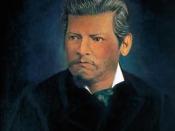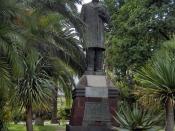"Christmas in the Mountains", by Ignacio Manuel Altamirano captures the essence of Mexican turmoil in the nineteenth century. Altamirano provides a distinctive, expressive, and romanticized analysis of the isolated, rural community and the contributions it could make to the nation-state. After the chaos and bloodshed of the earlier decades in the century, Altamirano hoped for a utopian Mexico - to combine the tradition from the indigenous people with the top components of Spanish political influence. In this novel specifically, he idealizes the small mountainous village that the protagonist, an army Captain, visits. Altamirano creates this remote village as the perfect society of which he dreams, combining Church and military ideals with the traditions of the indigenous people. Essentially, Altamirano views Christianity as purified, holy liberalism.
Throughout the novel, Altamirano conveys this idea through the interactions with his characters. Together, they worship, progress, and share morals. In conversation with the Captain, the priest says, "A democratic individual or a disciple of Jesus, isn't he perhaps the same person?" (24).
Here, Altamirano's visions are clearly articulated, again reaffirming one of the novel's main themes of how to create a utopian nation-state. In their first meeting, the Captain is uneasy about the priest's ideals. However, his opinion slowly transforms into a more positive one as the priest speaks about the nature of the village as well as his role in it. He says,
I have a very modest abode...like the parish houses of all priests of very poor
villages. My parishioners live from the product of their laborious, but not always
profitable, toil. They are farmers and herdsmen and at times their harvests and
their cattle scarcely produce enough to feed their families. So to support a priest
is too heavy a burden for them...It is necessary...Captain...that you may overlook
my poverty, which...


